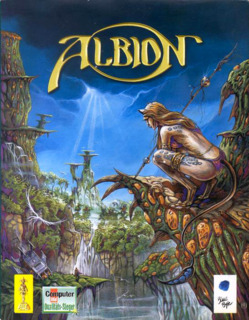An enjoyable and surprisingly deep game in an intricate world, that is unfortunately hurt by below average gameplay.
First, let's start with the major advantages of the game: setting and plot. You are Thomas Driscoll, a pilot in the employment of the Doilmr-Toyota-Thompson corporation and a member of the DTT Toronto mining vessel crew, whose target is a desert planet rich in minerals and ripe for harvest. You are to perform a routine survey flight to the planet with a xenobiologist, Rainer. However, when approaching the planet, it turns out it's not quite a desert and not by far deserted. Suddenly, your shuttle malfunctions and you are forced to make emergency planetfall...
From the very first moment of the game, you know you are in for quite an adventure. The begining plays out in the Toronto's crew section and you get to taste just how complex the backstory and setting of the game is, done simply by accessing an information pylon in the hallway, or asking any of the more important characters by typing in a keyword. The game designers present you with their concept of how the world would evolve in the future, an example of which is the militarization of the environmentalist, who surrounded the Galapagos island with a minefield to prevent interference from the outside. Asking characters provides the gamer with even more insight, as they can tell you about the history of the world prior to the game's beginning. After planetfall, the amount of available information to the player grows considerably, as the alien culture of the Iskai (cat-like felinoids) is quite developed in-game, complemented by a similiar, keyword-based question system available for major characters in the game, made even more expansive by the fact that certain characters have much different and more elaborate answers to your questions. And this is only the beginning, as each culture you meet later will have it's own issues the gamer can learn about and understand. Another area in which the game shines is the plot. It is well developed, easy to follow and, most importantly, logical and understandable. In order to avoid spoiling the pleasure of discovering it, let me just say, that not everything is as it seems and friends are not necessarily your friends. Characters are what further distinguishes the game. You will be able to have six additional humans and Iskai on your team in the game to experience the adventure with you, and each of them will have a story to tell and some will not tell all about themselves at the beginning of your camaraderie...
However, the excellent writing, character development and plot are marred by a single thing - gameplay. While ambitious, Albion falls short of providing gameplay of equal quality to writing. Basically it's a hybrid, with 2D top-down navigation in areas where no fighting is required (except in outdoor areas) and pseudo-3D navigation in dungeons and cities (imagine Wolfenstein 3D in a fantasy setting). While graphics are excellent in 2D mode, the low resolution and lack of point'n'click movement mean you have to guide your character all the way to the point you want him to get, and the short range of the mouse (which only moves the character or affects the environment in a relatively short range around him) make this a chore until you get used to it.
The 3D dungeons are one of the worst I've seen. While completeable, they suffer from the lack of intuitive controls and and dungeon crawling mechanics. You will spend quite a lot of time crawling through them and they will become a pain after the first completed one. These gameplay disadvantages are countered a bit by an intricate turn-based combat system, where positioning of your characters means a lot, as do their statistics and equipment. Sadly, you cannot directly affect your character's statistics, except for critical hit propability and fighting skills. The difficulty of the game is also a big letdown - while the first island, the land of the Iskai is easy to complete and leave, the slow level progression of characters due to small XP rewards and high level XP requirements coupled with the much, much higher difficulty of the next island mean that you can finish the first island completely unprepared for what lies ahead. Both these flaws and advantages are veiled in beatiful, detailed 2D graphics, which both charm and immerse the player, as well as make the land of Albion a place that looks convincing, real and inviting. To sum it all up, if you can ignore below average gameplay and tedious 3D dungeons, you will be gifted with a game with an unusual level of depth, particularly when the game touches upon the subject of philosophy and human nature in a certain part, something not many games dare to do in the 21st century.

